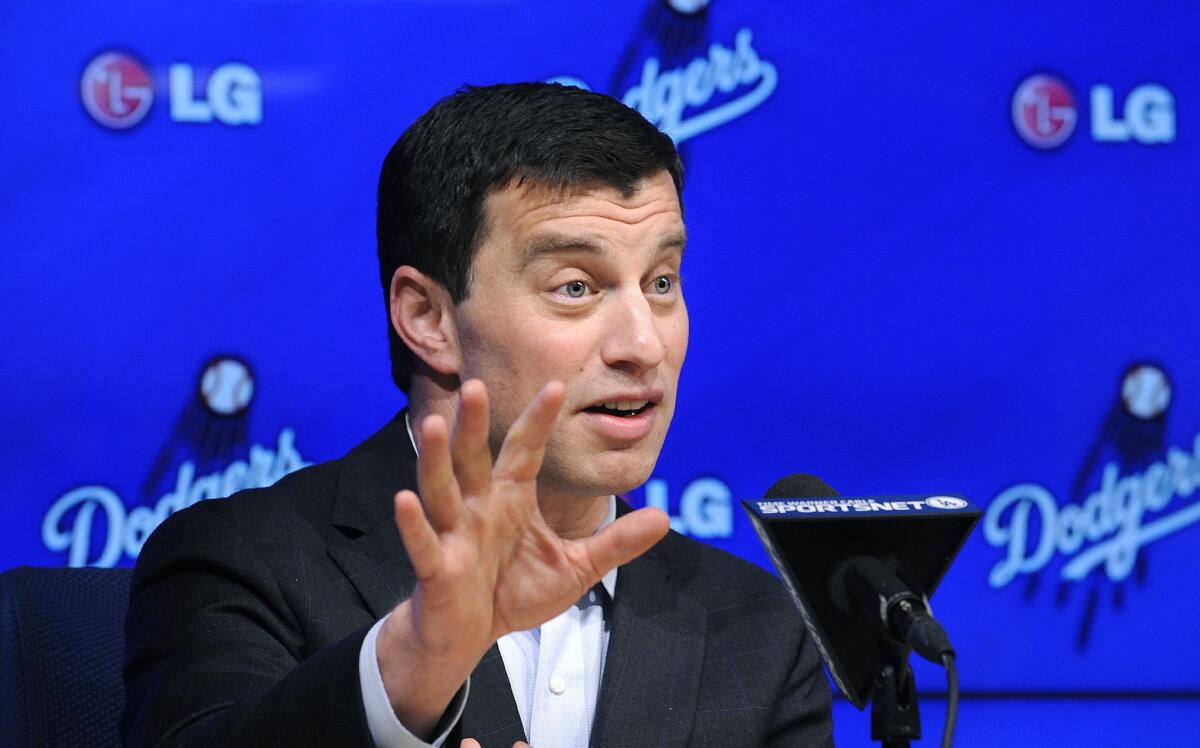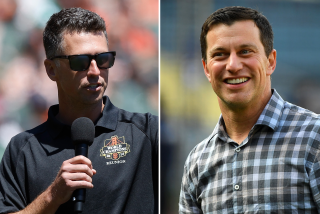Numbers only part of equation for new Dodgers boss Andrew Friedman

FROM PHOENIX — The first thing you notice about the Dodgers’ new sabermetric savior is not a scribbled spreadsheet, but a square jaw.
On a sunny morning at Camelback Ranch, that jaw is bulging with sunflower seeds, this forward thinker doing some old-fashioned chewing, and spitting, and chewing.
The second thing you notice is that all this is happening not behind a desk or computer, but behind a batting cage.
In the early days of Dodgers spring training, Andrew Friedman is nearly living at the fields, leaning against cages, standing alongside pitching mounds, observing and greeting and just hanging around, the team’s new president of baseball operations acting like just another sandlot junkie.
His eyes are covered by wraparound sunglasses, his face is dotted by beard stubble, and his polo shirt strains at his shoulders. He looks like an aging, gritty outfielder — a position he played in college — more than a new-age baseball executive.
“This is the essence of what we do,” he says with a seed-filled grin.
So far, this essence is far different than the one some people assumed would consume the Dodgers organization after its baseball future was placed in the hands of this 38-year-old former investment banker.
Yeah, Friedman is a stats guy, but he’s also a swing guy, as he hustles between fields to watch the batting practice of an obscure camp catcher.
“In this business, information is the most powerful thing, and it comes in all different ways and shapes and forms,” he says.
Friedman loves his numbers, but he also loves his bullpen sessions, and he leans against a fence talking on his smartphone while watching anonymous relievers throw fastballs.
“This is their office,” he says of the players and staff while waving his hands toward the fields. “They’re more comfortable out here. This is where we can have conversations, forge relationships, create trust.”
He is remaking the Dodgers to his specifications, but he is not doing it alone. He walks around the fields talking with everyone, from coaches to instructors to scouts, shaking hands, patting backs and listening.
“Oh yeah, he listens,” Dodgers Manager Don Mattingly says. “He brings a lot of new ideas to the table, but he listens to what everyone has to say, and you feel you are being heard.”
Several other Dodgers staff members and players echoed that opinion during the first few days of camp, many of them marveling at the youthful openness being created by former Tampa Bay whiz kid Friedman and his new general manager, Farhan Zaidi of Oakland Moneyball fame.
“I want them to know the passion we have for winning,” Friedman says.
Uncommunicated passion proved to be the ultimate downfall of the other Dodgers executive who attempted to bring the team into the sabermetric era, Paul DePodesta, who was hired in 2004 and lasted just two seasons.
This columnist took plenty of Internet heat for allegedly running DePodesta out of town because of his Moneyball ideas, but the harshest criticism here was never about his numbers — which have rightfully been accepted as part of baseball gospel — but his communication. DePodesta, a decent sort, rarely emerged from his Dodger Stadium bunker to engage in the sort of dialogue that would have helped bring the team together. Instead, his disconnected decisions polarized the organization into two camps — stats versus observation — and it required the swagger of Ned Colletti to put everyone back on the same page.
Eleven years later, Friedman’s persona invites the sort of collaboration that was absent under DePodesta, and is necessary for his ideas to work.
“Any ‘us versus them,’ that’s not there,” Friedman says. “We’re going to explain things, talk through things, take a pragmatic approach to winning games.”
He adjusts his sunglasses and smiles again. “All of our interests are perfectly aligned, and that’s to win a World Series.”
That philosophical alignment led to a curious question asked of this writer by one of the more plodding Dodgers early in camp: “So do you think Friedman would ever want me hitting leadoff? Hey, that’s cool if he does.”
Contrary to the reputation of some young sabermetrics-bent executives who have old-school managers, Friedman says he will not essentially make out the lineup card for Mattingly. However, it is clear they will discuss the lineup far more than most managers and executives. Knowing how Mattingly can sometimes be misled by his gut instincts — the handling of Yasiel Puig in Game 4 of the National League division series last year, for example — another opinion is not necessarily a bad thing.
“Don has a job and that’s to manage our 25-man roster and deploy them on a nightly basis for what gives us the best chance to win, but there will obviously be debate over what that means, and there should be,” Friedman says. “Donnie is so mired in the day-to-day stuff that sometimes he doesn’t see things as clearly, while other times he has his finger much more on the pulse than we do. It’s all about us listening to each other.”
Friedman has actually been to the World Series in the last 26 years — unlike the Dodgers — so his voice should have credibility. Still, that voice was loudly shouted down this winter in some corners — including this one — when he traded Matt Kemp to San Diego in a move that will be questioned until the Dodgers show they can win without him.
Friedman also shipped out fan favorite Dee Gordon, installed a veteran infield in Howie Kendrick and Jimmy Rollins, and raised more eyebrows by spending big money on pitchers Brandon McCarthy and Brett Anderson.
Lots of changes. Lots of pressure. His team. His image. Big heat. And here under the sun at Camelback Ranch, Friedman is running around the fields soaking it in with the sort of easy honesty that the Dodgers have found refreshing.
Scared? “A little bit,” Friedman admits. “This forces me to be uncomfortable. I left an incredibly comfortable situation in Tampa. But part of the attraction in coming here is forcing myself to be uncomfortable, I look at it like a good thing.”
Settled? Not exactly. He acknowledges that he has been too busy to move from Tampa to Los Angeles, so he, his wife and two young children are living in a rental home in the Phoenix area and hoping to find a home around Los Angeles by opening day.
“We are nomads,” he says. “This winter was so frenetic, I had to react on so many fronts, traveling back and forth . . . it almost felt like an out-of-body experience.”
Well, Andrew Friedman is here now, and he’s as real as that sideways lean against a batting cage, and the craning of the neck toward a pitcher on another field, and a glance at three guys running on a dirt path, and the scrunching of his hands on that bag of seeds.
“We just try to do things that make sense,” the Dodgers’ new baseball guy says, making total sense.
Follow Bill Plaschke on Twitter @billplaschke
More to Read
Are you a true-blue fan?
Get our Dodgers Dugout newsletter for insights, news and much more.
You may occasionally receive promotional content from the Los Angeles Times.








